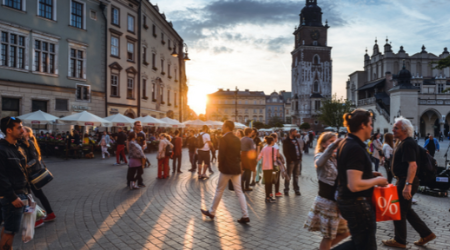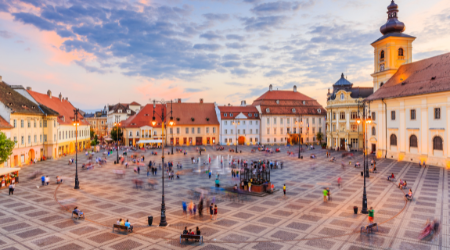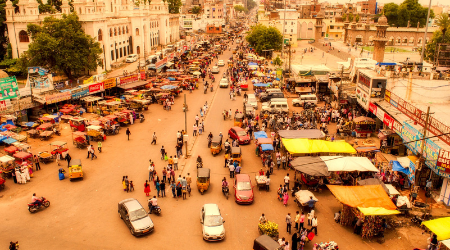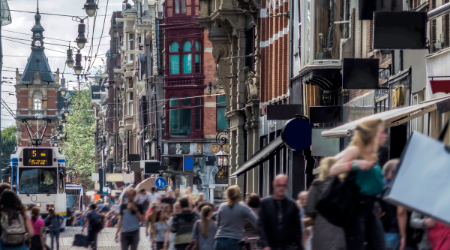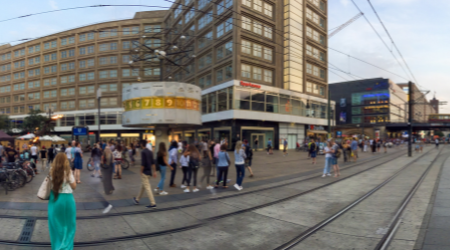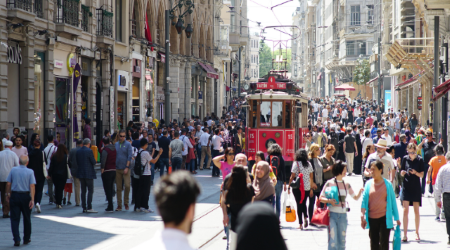War in Ukraine: A View from the United Kingdom
On a cold, sunny day in March, over a hundred of us met at the Royal Pavilion, a genteel Victorian bandstand in the seaside town of Eastbourne, to begin a 10-mile walk along the coast to raise funds for Ukraine refugees, locally referred to as “guests.” I’ve lived on the South Coast for over 25 years and grown to love the quintessential English villages and rolling hills of the South Downs. As I looked over the beach huts—some painted in colors of the Ukrainian flag—the shingle beach and, for once, the sparkling blue-grey sea, this Walk for Ukraine seemed far removed from the devastation brought about by Russia’s invasion of Ukraine.
Yet this local event provided some clues into the emotional response in the UK to the Ukraine war. It is intimately connected to a regard for the underdog, and respect for any nation that defies a better-armed aggressor. In an echo of Winston Churchill’s famous speech (“We will fight them on the beaches”), Eastbourne residents have painted large beach pebbles in blue and yellow, and inscribed them with “We stand with Ukraine.” This section of the coastline is redolent with associations of the Second World War. Fighter squads were based here during the war, the chalk cliffs of Beachy Head providing the last view of England for RAF pilots as they took off to patrol the Channel. Russia’s actions in Ukraine are seen through the filter of the Second World War, as evidenced by Boris Johnson, the UK’s Prime Minister, evoking Churchill in his speech to the Ukraine Parliament by declaring: “This is Ukraine's finest hour, that will be remembered and recounted for generations to come," echoing Churchill in 1940 when Britain faced the real possibility of being invaded and defeated by Nazi Germany.
The consequences of Russian aggression are not that abstract either for many in the UK. The country has long been a refuge for Russian dissidents and opposition leaders. It has also seen a disturbing trail of assassinations: Alexander Litvinenko in 2006 from polonium poisoning; Georgi Markov in 1978 from a poison pellet fired from umbrella; and the more recent “Salisbury Plain Poisoning,” where agents from Russia used Novichok nerve agent in the attempted murder of Sergei and Yulia Skripal. All of these remind the British public that geographical distance from inimical nations no longer matters—and indeed, Russia has emphasized this message in its recent threats of nuclear reprisal against Britain. A recent YouGov survey reveals that some three-quarters of British adults are concerned about a nuclear strike from Russia, and one-third think it is likely.
The public response to Ukraine has been warm and generous. The country created a new Guinness World Record for the most money raised by an online campaign in one week (over GBS 61 million). The campaign, organized by the UK’s Disasters Emergency Committee (an umbrella organization for 15 leading UK charities to respond speedily to crises overseas), has so far raised over GBS 300 million, with staunch support from the Duke and Duchess of Cambridge. The war relief efforts continue to receive a high profile, with a live broadcast of a fundraising concert featuring artists including Ed Sheeran and Emeli Sandé alongside Ukrainian singer and former Eurovision winner Jamala.
The UK government does seem to see the crisis as part of the evolution of the UK post-Brexit as a nimble player on the global stage, capable of showing leadership and forging bilateral alliances. The UK has been seen working closely with the US through joint intelligence, and creating stronger ties with Nordic countries, Poland, and the Baltics. The UK has pledged considerable military support to Ukraine. As of May 2022, it has provided £2.8 billion to Ukraine through humanitarian aid and grants, plus military kit including 120 armored vehicles, air defense systems, and more than 6,500 anti-tank missiles. The UK public is mixed on the status of a new “Global Britain.” A recent poll found that 36 percent believe that being outside the EU has strengthened the UK’s response to the Ukraine crisis, while 26 percent think Brexit has weakened Britain’s response.
The UK’s pro-Ukrainian bullish response (it announced in May a further round of sanctions on Russia and Belarus targeting £1.7 billion worth of trade, and companies such as Shell and BP have withdrawn from Russia) is a continuation of the deteriorating relationships with Russia. Compared to some other European countries, Britain has more room to call for sanctions and cut trade ties. House of Commons research shows that Russia is the UK’s 19th largest trading partner, with direct imports mainly consisting of metals and precious stones. The UK is also less reliant on Russian gas and oil; in 2021 imports from Russia made up only 4 percent of gas used in the UK, 9 percent of oil, and 27 percent of coal. The government has committed to ending energy imports of Russian oil and coal by the end of 2022. There are plans to increase production of North Sea oil for the short term and to accelerate green energy as a longer-term solution.
There are, however, several cracks in the image of the UK as a generous friend to Ukraine. There is building criticism, both home and abroad, of how few refugees the UK has received so far. On 8 April, the Home Office reported that a total of 40,900 visas had been issued—28,500 through the Ukraine Family scheme (for Ukrainian nationals who have family members who are British citizens or are settled in the UK), and 12,400 through the Homes for Ukraine scheme. The latter government-led scheme, which enables people to open their homes to those fleeing the war, has been plagued with delay (partly by concerns about how to vet applications). The scheme has also been criticized for not allowing children under 18 to enter the UK, even when a host family has offered to sponsor them.
Far more problematic is the flow of Russian money into the UK, with London seen as the epicenter of Russian money laundering. Amid intense pressure, the UK recently canceled its much-criticized “golden visa,” which offered residency to those able to invest GBS 2 million or more into the UK, and acted as a magnet for Russian oligarchs. Since the plan's introduction in 2008, some 2,581 investor visas have been issued to Russian citizens. The anticorruption organization Transparency International reports that at least GBS 1.5 billion of UK property is owned by Russians accused of financial crime or links with the Kremlin. The government is scrambling to tackle the problem with the introduction of the Economic Crime Bill.
Public support and political goodwill have gone only so far to help Ukraine; while the UK has been generous with funds and military support, the sincerity of its position will remain under question while Ukraine refugees find the UK effectively closed to them yet Russian money continues to find a way through.







